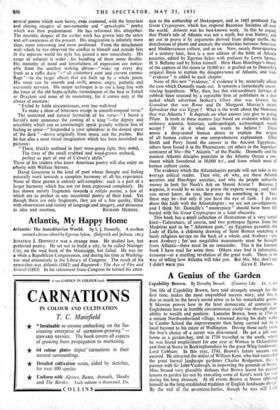Atlantis, My Happy Home
Atlantis: The Antediluvian World. By I. J. Donnelly. A modern revised edition edited by Egerton Sykes. (Sidgwick and Jackson. 28s.) largAnos J. DONNELLY was a strange man. He studied law, but preferred poetry. He set out to build a city, to be called Nininger City, on the west bank of the Mississippi, but failed. He was for a while a Republican Congressman, and during his time at Washing- ton read extensively in the Library of Congress. The result of his researches was Atlantis (1882) and Ragnarok : The Age of Fire and Gravel (1883). In his retirement from Congress he turned his atten- tion to the authorship of Shakespeare, and in 1885 produced The Great Cryptogram, which has inspired Baconian Societies all over the world. Atlantis was his best-known work. In this he argued that Plato's tale of Atlantis was not a myth, but true history, and set out to prove it by arguments derived from deluge myths, the distribution of plants and animals, the similarities between American and Mediterranean culture, and so on. Now, nearly three-quarters of a century later, here is a new edition of the bible of Atlantis societies, edited by Egerton Sykes with prefaces by Lewis Spence, H. S. Bellamy and by Sykes himself. Here Hans Hoerbiger's theory of the capture of the moon in 10,000 Ac. is grafted on to Donnelly's original thesis to explain the disappearance of Atlantis, and fresh
" evidence " is added to each chapter. - None of this new "evidence," if evidence it be, materially affects the case which Donnelly made out. It remains a fantastically uncon- vincing hypothesis. Why, then, has this extraordinary farrago of
rubbish been reissued by a reputable firm of publishers in a dust jacket which advertises Stobart's Glory that was Greece, his Grandeur that was Rome and Dr. Margaret Murray's recent Splendour that was Egypt ? What is the truth about the Nonsense that was Atlantis.? It depends on what answer you give to jesting
Pilate. Is truth in these matters fact based on evidence which the ordinary scientist, historian, anthropologist, archaeologist would accept ? Or is it what one wants to believe ? There seems a deep-seated human desire to explain the origins of all human culture in one comprehensive explanation. Elliot Smith and Perry found the answer in the Ancient Egyptians; others have found it in the Phoenicians, yet others in the legendary continent of Mu—the " Atlantis " of the Pacific. Donnelly and his modern Atlantis disciples postulate in the Atlantic Ocean a con- tinent which foundered in 10,000 Ac., and from which most of human culture came.
The evidence which the Atlantologists parade will not take in the average critical reader. Then why, oh why, are there Atlantis• societies and Hoerbiger societies, and why do people subscribe money to look for Noah's Ark on Mount Ararat ? Because, 1 suppose, it would be so nice to prove the experts wrong ; and, well you never know, do you, there may be something in it. Yes ; there may be—but only if you have the eye of faith. I do not
share this faith with the Atlantologists ; we are not co-religionists, and I think Mr. Donnelly's " masterpiece " should have been left buried with his Great Cryptogram in a kind obscurity.
This book has a small collection of illustrations of a very varied kind-.-Tiahuanacti, of course, and two grotesque figures from the Madeiras said to be .” Atlantean gods," an Egyptian pyramid. the Lady of Elche, a chirming drawing of Saint Brenan snatching a hasty religious service on the back of a whale, and Avebury—yes, even Avebury ; for 'our megalithic monuments must be brought
from Atlintis—there must be no remainder. This is the funniest book I have read for some time. Others may find it infuriating,
tiresome—or a startling revelation of the great truth. There is no way of telling bow Atlantis will take you. But Mu, Mu, don't say


































 Previous page
Previous page